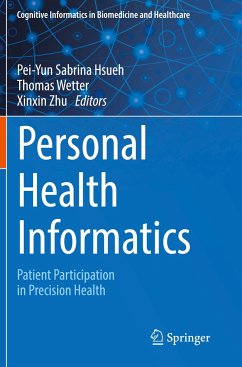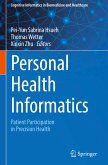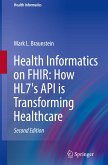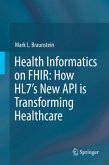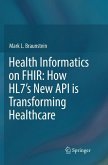Personal Health Informatics
Patient Participation in Precision Health
Herausgegeben:Hsueh, Pei-Yun Sabrina; Wetter, Thomas; Zhu, Xinxin
Personal Health Informatics
Patient Participation in Precision Health
Herausgegeben:Hsueh, Pei-Yun Sabrina; Wetter, Thomas; Zhu, Xinxin
- Broschiertes Buch
- Merkliste
- Auf die Merkliste
- Bewerten Bewerten
- Teilen
- Produkt teilen
- Produkterinnerung
- Produkterinnerung
This book clarifies consumer and personal health informatics and their relevance to precision medicine and healthcare applications. Personal Health Informatics covers a broad definition of this emerging field, with individuals not simply consuming health but as active participants, researchers and designers in the healthcare ecosystem. The world of health informatics is constantly changing given the ever-increasing variety and volume of health data, care delivery models that shift from fee-for-service to value-based care, new entrants in the ecosystem and the evolving regulatory decision…mehr
Andere Kunden interessierten sich auch für
![Personal Health Informatics Personal Health Informatics]() Personal Health Informatics51,99 €
Personal Health Informatics51,99 €![Health Informatics on FHIR: How HL7's API is Transforming Healthcare Health Informatics on FHIR: How HL7's API is Transforming Healthcare]() Mark L. BraunsteinHealth Informatics on FHIR: How HL7's API is Transforming Healthcare45,99 €
Mark L. BraunsteinHealth Informatics on FHIR: How HL7's API is Transforming Healthcare45,99 €![Health Informatics on FHIR: How HL7's New API is Transforming Healthcare Health Informatics on FHIR: How HL7's New API is Transforming Healthcare]() Mark L. BraunsteinHealth Informatics on FHIR: How HL7's New API is Transforming Healthcare46,99 €
Mark L. BraunsteinHealth Informatics on FHIR: How HL7's New API is Transforming Healthcare46,99 €![Health Informatics on FHIR: How HL7's New API is Transforming Healthcare Health Informatics on FHIR: How HL7's New API is Transforming Healthcare]() Mark L. BraunsteinHealth Informatics on FHIR: How HL7's New API is Transforming Healthcare37,99 €
Mark L. BraunsteinHealth Informatics on FHIR: How HL7's New API is Transforming Healthcare37,99 €![Consumer Informatics and Digital Health Consumer Informatics and Digital Health]() Consumer Informatics and Digital Health70,99 €
Consumer Informatics and Digital Health70,99 €![Personalized and Precision Medicine Informatics Personalized and Precision Medicine Informatics]() Personalized and Precision Medicine Informatics108,99 €
Personalized and Precision Medicine Informatics108,99 €![Personalized and Precision Medicine Informatics Personalized and Precision Medicine Informatics]() Personalized and Precision Medicine Informatics77,99 €
Personalized and Precision Medicine Informatics77,99 €-
-
-
This book clarifies consumer and personal health informatics and their relevance to precision medicine and healthcare applications. Personal Health Informatics covers a broad definition of this emerging field, with individuals not simply consuming health but as active participants, researchers and designers in the healthcare ecosystem. The world of health informatics is constantly changing given the ever-increasing variety and volume of health data, care delivery models that shift from fee-for-service to value-based care, new entrants in the ecosystem and the evolving regulatory decision landscape. These changes have increased the importance of the role of patients in research studies for understanding work processes and activities, and the design and implementation of health information systems. Therefore, personal health informatics now provide research tools and protocols to engage within individual contexts when developing solutions, which can improve clinical practice, patientengagement and public health.
Personal Health Informatics offers a snapshot of this emerging field, supported by the methodological, practical, legal and ethical perspectives of researchers and practitioners. In addition to being a research reader, this book provides pragmatic insights for practitioners in designing, implementing and evaluating personal health informatics in healthcare settings. It represents an excellent reader for students in all clinical disciplines and biomedical and health informatics to learn from the case studies provided in this emerging field.
Personal Health Informatics offers a snapshot of this emerging field, supported by the methodological, practical, legal and ethical perspectives of researchers and practitioners. In addition to being a research reader, this book provides pragmatic insights for practitioners in designing, implementing and evaluating personal health informatics in healthcare settings. It represents an excellent reader for students in all clinical disciplines and biomedical and health informatics to learn from the case studies provided in this emerging field.
Produktdetails
- Produktdetails
- Cognitive Informatics in Biomedicine and Healthcare
- Verlag: Springer / Springer International Publishing / Springer, Berlin
- Artikelnr. des Verlages: 978-3-031-07698-5
- 1st edition 2022
- Seitenzahl: 596
- Erscheinungstermin: 23. November 2023
- Englisch
- Abmessung: 235mm x 155mm x 32mm
- Gewicht: 890g
- ISBN-13: 9783031076985
- ISBN-10: 3031076982
- Artikelnr.: 69226251
- Herstellerkennzeichnung Die Herstellerinformationen sind derzeit nicht verfügbar.
- Cognitive Informatics in Biomedicine and Healthcare
- Verlag: Springer / Springer International Publishing / Springer, Berlin
- Artikelnr. des Verlages: 978-3-031-07698-5
- 1st edition 2022
- Seitenzahl: 596
- Erscheinungstermin: 23. November 2023
- Englisch
- Abmessung: 235mm x 155mm x 32mm
- Gewicht: 890g
- ISBN-13: 9783031076985
- ISBN-10: 3031076982
- Artikelnr.: 69226251
- Herstellerkennzeichnung Die Herstellerinformationen sind derzeit nicht verfügbar.
Pei-Yun Sabrina Hsueh, PhD, FAMIA is a serial Global Health AI Industry Leader, specializing in real-world data science and strategy. She is a Board Member of the Association of Computing Machinary Practitioners Board, the co-Chair of AI Evaluation Showcase 2023, the Vice Chair of AMIA 2022, and an elected Fellow of American Medical Informatics Association (FAMIA) and serves on the Steering Committees of Women in AMIA and Work Groups. She previously served as the Chair of the Consumer and Pervasive Health Informatics Work Group at AMIA and led Behavioral Analytics works at the Centre for Computational Health of IBM Research. Dr. Hsueh has been a pioneer in the area of Health AI with a focus on evidence generation and validation across technical, workflow, and system integration. She has been elected as IBM Academy of Technology Member, co-chair of IBM Health Informatics Professional Community, and the European Google Anita Borg Scholar. She authored 20+ patents and 60+ technical articles in the fields of computational linguistics and applied informatics. Her expertise in the emerging areas and industry solutions makes her a sought-after speaker and consultant, winning AMIA Distinguished Paper Award, multiple invention, research achievement and manager choice awards, and Eminence and Excellence Award. She has also been chairing applied data science events at major conferences such as AMIA, MEDINFO, MIE, and KDD and is also actively involved in the public policy consultation and serves on the FDA response team in the AMIA public policy committee and IEEE Standards Committee. Sabrina is devoted to mentor newcomers and women leaders who are pursuing interdisciplinary career paths. She is a founding co-director of the joint podcast series between ACM and AMIA on this topic. To provide updates to the fast-evolving field, She has also been editing new textbooks on Machine Learning for Medicine and Healthcare (Springer Nature), Personal Health Informatics (Springer Nature) and is an invited special issue editor in Frontiers in Public Health, Sensors Journal and Journal of America Medical Informatics Association [JAMIA OPEN]. Prof. (em.) Dr. Thomas Wetter is a Medical Informatics scholar with twelve years of experience in industry research and 30 years of experience in academic research and teaching in Biomedicine. A graduate and PhD in Mathematics from Aachen Technical University he worked most of his career on applying formal methods to biomedical problems. After eight years of physiological research in Aachen he joined the IBM Heidelberg Scientific Center. Here he researched and published on Human Computer Interface design, Artificial Intelligence, Natural Language Processing, Voice Recognition, and Software Quality. In 1997 he was appointed a full professor for Medical Informatics at Heidelberg University. Besides teaching in the curricula Medical Informatics and Medicine his research interests were in clinical applications of Voice Recognition and Artificial Intelligence and later in Consumer Health Informatics. In the years till 2018 his assignments included the management of a CME academy, the Heidelberg part of an international student exchange program (IPHIE), associate editor of the International Journal of Medical Informatics, and deputy chair and later chair of the IMIA WG Consumer Health Informatics. Besides various articles in scientific journals he is the editor of conference proceedings in artificial intelligence and author of the Springer 2016 textbook "Consumer Health Informatics. New Services, Roles, and Responsibilities." During his active time Dr. Wetter spent sabbaticals at the University of Utah and the University of Washington. After his retirement he was engaged by Ben-Gurion-University of the Negev in Be'er Sheva, Israel to help develop a curriculum in Medical Informatics. Xinxin (Katie) Zhu, MD, PhD, FAMIA, FIAHSI. Executive Director, Center for Biomedical Data Science, Yale University. Dr. Xinxin Zhu is a clinician and healthcare informatics professional with more than a decade of experience in health management, biomedical informatics, and data science. In addition to her medical training and practice in anaesthesiology, she also received her M.S. in Computer Science from Rensselaer Polytechnic Institute and Ph.D. in Biomedical Informatics from Columbia University under the National Library of Medicine fellowship. Prior to joining Yale faculty, Dr. Zhu served as an External Advisory Board member to the Center for Advanced Technology at Columbia University, physician scientist lead of pervasive health at the Center for Computational Health at IBM Watson Research, Chief Medical Information Officer at Kforce Government Solutions, associate medical director at Pfizer, clinical project manager at Philips, and healthcare subject matter expert at the U.S. Department of Veterans Affairs. She is the recipient of many excellence awards, and author of high-impact scientific publications and more than a dozen issued patents. She served as the area editor for the Health Systems Journal, and co-editor of the book "Digital Health: Mobile and Wearable Devices for Participatory Health Applications". Dr. Zhu has also served as Co-Chair for the American Medical Informatics Association's Global Health Informatics Working Group, VP of Membership for the Consumer and Pervasive Health Informatics Working Group, as well as Scientific Program and Women Leadership Committee member. She is currently the Co-Chair for the International Medical Informatics Association's Organizational and Social Issues in Healthcare Working Group. She was elected to the fellowship of the American Medical Informatics Association and the International Academy of Health Sciences Informatics.
E-enabled Patient-Provider Communication in Context.- Value-Based Care for Direct Primary Care Model.- Opportunities and Challenges of Implementation in the Trench: e-Concierge Point-of-Care.- Population Health Management and Primary Care Transformation with Care Management.- Safer Homes for Personal Health and Patient Safety.- Health App By Prescription: The German Nation-Wide Model.- Wearable Health Model for Chronic Disease Management.- Patient Electronic Health Records.- Patient Portal for Critical Response during Pandemic: A Case of COVID-19.- Patient-centered Electronic Health Records.- Incorporating External and Internal Factors into Personal Health: Considerations of the Design for Citizen Health Services.- Experiment and Research Design for Health App.- Early Detection of Mental Decay Through Mobile and Tangible Health Devices.- Mobile Health Platform for Comparative Effectiveness.- Insights about Methods for Analyzing Longitudinal Patient Observations.- Patients as Equal Partners in the Design Process.- Methodology for Person-Centered Design for Citizen Science.- Health Community and Regional Perspective for Health Equality: OurVoice Citizen Science.- Ecosystem of Patient-Centered Research and Information System Design for Caregivers.- Behavioural Science for Digital Health.- Citizen Science for Research from the Patient's Perspective.- Challenges in Leveraging Library & Information Science to Discover Consumer Health Informatics Research.- Opportunities and Future Directions in Consumer Health Informatics Terminology Evolution.- OMOP and ODHSI for Patient-reported Data.- Evaluation of Programs Based on Citizen Initiatives.- Security and Privacy Architecture and Protocols for Compliance Standard for Patient Portal and Patient Sensor Data in Norwegian National Information System.- Framework for Revisiting Health Information Technology for Ethical, Legal, and Social Issues and Evaluation: Telehealth/Telemedicine and COVID-19.- Ethical Framework for Physicians.- Ethical Framework for Medical Informaticists.- Ethical framework for Business.- Ethical Framework for citizen science research.
E-enabled Patient-Provider Communication in Context.- Value-Based Care for Direct Primary Care Model.- Opportunities and Challenges of Implementation in the Trench: e-Concierge Point-of-Care.- Population Health Management and Primary Care Transformation with Care Management.- Safer Homes for Personal Health and Patient Safety.- Health App By Prescription: The German Nation-Wide Model.- Wearable Health Model for Chronic Disease Management.- Patient Electronic Health Records.- Patient Portal for Critical Response during Pandemic: A Case of COVID-19.- Patient-centered Electronic Health Records.- Incorporating External and Internal Factors into Personal Health: Considerations of the Design for Citizen Health Services.- Experiment and Research Design for Health App.- Early Detection of Mental Decay Through Mobile and Tangible Health Devices.- Mobile Health Platform for Comparative Effectiveness.- Insights about Methods for Analyzing Longitudinal Patient Observations.- Patients as Equal Partners in the Design Process.- Methodology for Person-Centered Design for Citizen Science.- Health Community and Regional Perspective for Health Equality: OurVoice Citizen Science.- Ecosystem of Patient-Centered Research and Information System Design for Caregivers.- Behavioural Science for Digital Health.- Citizen Science for Research from the Patient's Perspective.- Challenges in Leveraging Library & Information Science to Discover Consumer Health Informatics Research.- Opportunities and Future Directions in Consumer Health Informatics Terminology Evolution.- OMOP and ODHSI for Patient-reported Data.- Evaluation of Programs Based on Citizen Initiatives.- Security and Privacy Architecture and Protocols for Compliance Standard for Patient Portal and Patient Sensor Data in Norwegian National Information System.- Framework for Revisiting Health Information Technology for Ethical, Legal, and Social Issues and Evaluation: Telehealth/Telemedicine and COVID-19.- Ethical Framework for Physicians.- Ethical Framework for Medical Informaticists.- Ethical framework for Business.- Ethical Framework for citizen science research.

